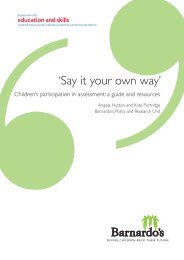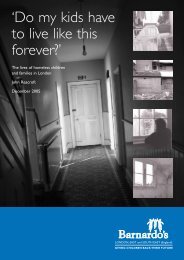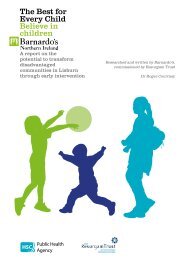Splintered Lives - Barnardo's
Splintered Lives - Barnardo's
Splintered Lives - Barnardo's
You also want an ePaper? Increase the reach of your titles
YUMPU automatically turns print PDFs into web optimized ePapers that Google loves.
The COE also supports moves to make nationals responsible for criminal acts<br />
committed outside respective countries:<br />
"extraterritorial jurisdiction in order to allow the prosecution and punishment of<br />
nationals who have committed offenses concerning sexual exploitation of children<br />
outside the national territory" (p6).<br />
Increased information exchange through Interpol is suggested in order to identify<br />
offenders and organisers, especially in relation to trafficking. This is echoed by Groner<br />
(1993) who argues for a Europol/lnterpol clearing house.<br />
Neither the COE or UN documents note the importance of tracking and destroying child<br />
pornography following a conviction; yet this would constitute an element of justice for<br />
children and young people who have to live with the knowledge of the existence of<br />
records of their abuse.<br />
At the Brussels seminar participants were made aware of an ongoing debate within the<br />
UN about whether an optional protocol on sexual exploitation should be developed<br />
which would be linked to the Convention on the Rights of Child, Reflecting on the issues<br />
subsequently we are of the opinion that unless such a protocol adds significantly to<br />
what is already within the convention, and is legally binding, this is likely to be a waste<br />
of resources and energy. International and, for many countries, national law already<br />
exists; the problem lies in enforcement and political will. The telling points made in 'the<br />
discussion for us were: the money that would be spent enabling the drafting of a<br />
protocol versus the need to properly resource the special rapporteur; that time spent<br />
working up the proposal may well become time of inaction; and the fact that there are<br />
already 60 pages of international decisions directly pertaining to this issue.<br />
Other issues which have implications for a children's rights framework, which we have<br />
not already addressed are discussed below (in no order of importance).<br />
Questions about pornography and prostitution not being key issues in either child<br />
protection practice or that of agencies which provide support, advice, housing and<br />
advocacy for young people. Workers need education and training so that these issues<br />
become areas of knowledge and confidence. This will need to include challenging<br />
stereotypes about 'sex work', and understanding complex processes and meanings,<br />
especially for young people, where prostitution can appear to them the best of<br />
few/minimal choices, a form of power and control.<br />
Discussion of the policy within some fostering and adoption agencies of not telling<br />
carers about the level, forms and scale of abuse children have experienced. Where vital<br />
information is withheld carers can make unintended errors of judgement regarding<br />
everyday unquestioned behaviour involving, for example, cameras, gifts etc, which<br />
have complicated meanings for children which they are unaware of.<br />
PAGE 77<br />
chapter<br />
13
















